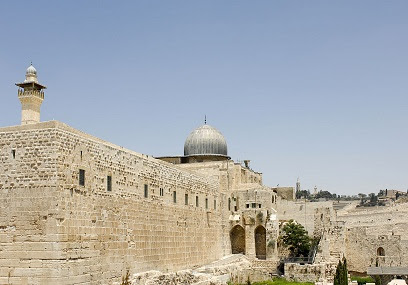ATFP News Roundup October 31, 2016 
News: Following the United States’ reelection to the United Nations Human Rights Council, U.S. Secretary of John Kerry criticized the body for its “biased focus on Israel.” (JTA/Times of Israel) Leaders of Hamas announced that they had offered Palestinian President Mahmoud Abbas a “complete vision” to achieving reconciliation between Hamas and the ruling Fatah movement. (Ma'an) Pres. Abbas' Political Rival Dahlan Says He Won't Seek Palestinian Presidency, Backs Jailed Barghouti. (Ha'aretz) Three Israeli Border Police officers were injured in a car ramming attack near Hebron, the fifth attempted West Bank attack in two days. (JTA) The United Nations Relief and Works Agency for Palestine Refugees in the Near East (UNRWA) announced that Kuwait would be donating $5 million to the organization. (Ma'an) A Palestinian allegedly carrying out a car-ramming attack was killed by Israeli forces near the village of Beit Ummar in the southern occupied West Bank district of Hebron early on Sundayevening. (Ma'an) The Israeli Foreign Ministry says relocating illegal West Bank outpost to abandoned Palestinian land would harm Israel. (Ha'aretz) Israeli authorities have banned 5-year-old Ibrahim from visiting his father, Palestinian Muhammad Ahmad Abd al-Fatah Abu Fanunah, in prison, Abu Fanunah’s wife said to Voice of Prisoners (Sawt al-Asra) radio on Sunday. (Ma'an) A prominent Israeli journalist and author quit his job on Sunday after a second woman accused him of sexual harassment, the first having been persuaded to go public by the raft of sexual assault allegations against U.S. presidential candidate Donald Trump. (Reuters/New York Times/JTA/Ha'aretz) Iraqi troops and security forces edged closer to Mosul on two southern fronts on Sunday but a leader of the Shi'ite militias newly participating in the offensive warned that the battle for Islamic State's Iraq stronghold would be long and grueling. (Reuters) Iraqi federal policemen stood over the corpse of an Islamic State suicide bomber covered by a curtain. The chain attached to his ankle was tied to a car that had dragged him through streets, they said, that were once part of a self-proclaimed jihadist caliphate. (Reuters) Gun trucks and humvees streamed north on a highway heading to Mosul on Sunday flying the banners of Shi’ite militias along with Iraqi flags while blaring religious songs. (Reuters) Iraqi Christians, scarred by Islamic State’s cruelty, doubt they will return to Mosul. (Washington Post) Twenty-six years after being forced from Lebanon's presidential palace and into exile by the Syrian army, Michel Aoun is set to be elected head of state on Monday, backed by many of his old enemies. (Reuters) An air raid by an Arab coalition killed 60 people in Yemen, including inmates of a prison near the city of Hodeidah, medical sources said. (Reuters/New York Times) Turkey said it had dismissed a further 10,000 civil servants and closed 15 more media outlets over suspected links with terrorist organizations and U.S.-based cleric Fethullah Gulen, blamed by Ankara for orchestrating a failed coup in July. (Reuters) Commentary: Roger Cohen says it’s easier to leave Palestinians in limbo waiting for a “peace process” that goes nowhere. (New York Times) Mohammed Othman says Palestinians are divided over the motives behind recent coordination between Hamas and dismissed Fatah leader Mohammed Dahlan. (Al-Monitor) Avi Issacharoff says the PA president has been meeting with the leaders of Turkey, Qatar and Hamas — perhaps because his friends are abandoning him. (Times of Israel) Aziza Nofal says a recent study found that despite the significant role foreign aid plays in the Palestinian economy, the private sector is not receiving the support it deserves. (Al-Monitor) Uri Savir says new UN Secretary-General Antonio Guterres will present innovative and proactive ideas for the United Nations to deepen its involvement in advancing the two-state solution. (Al-Monitor) Yossi Beilin looks at Pres. Obama's last chance to rectify Israeli-Palestinian peacemaking failures. (Ha'aretz) Akiva Eldar says Israeli Prime Minister Benjamin Netanyahu uses time and again the demand that Palestinians recognize Israel as the homeland of the Jewish people to sideline the issues of occupation and settlements. (Al-Monitor) Gideon Eshet says the rhetoric between Jerusalem and Gaza may be filled with deep hatred, but it allows both governments to prove there is no solution; In the meantime, the strip's residents are paying the price. (Ynet) Emile Hokayem says the weakening of the Islamic State will resurface more potent fault lines. (Washington Post) Hassan Hassan highlights some underlying troubles of the battle to liberate Mosul that should worry the US-led coalition. (The National) Hisham Melhem says the new American president will inherit a crumbling region, half of it in a state of conflagration and the other half struggling to protect itself from flames. (Al Arabiya) |